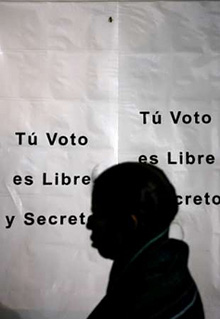 |
 |
 |
 News Around the Republic of Mexico | September 2006 News Around the Republic of Mexico | September 2006  
Officials Deny Access to July 2 Ballots, Fuel Doubts
 Hector Tobar - LATimes Hector Tobar - LATimes


| | A woman leaves a voting booth after casting her ballot in the small town of Navenchauc, Mexico. (Reuters/Daniel LeClair) |
Questions arise over the July 2 election results as officials move swiftly to burn the contest´s ballots.

Top electoral officials and judges are feeding doubts about the outcome of the presidential vote by declining to release details about a recount of 4 million ballots and by moving quickly to destroy all 41 million ballots, legal experts said late last week.

The seven judges of the Federal Electoral Tribunal declared conservative candidate Felipe Calderón president-elect on Tuesday. But the tribunal´s 300-page ruling on the election left some experts shaking their heads.

John Ackerman, a professor of law at the National Autonomous University of Mexico (UNAM), said the judges had made no effort to investigate improprieties in electoral financing and other charges made by losing leftist candidate Andrés Manuel López Obrador. The ruling also failed to cite a single legal precedent in its rejection of a López Obrador bid to have the election annulled, Ackerman said.

Final Recount Tallies Unreleased

The court opened ballot boxes and recounted 4 million votes, but did so only to determine whether there was evidence of outright fraud - and declared that they had found none. The actual tallies from the recount were not released to the public.

"The tribunal is explicitly preventing us from seeing what actually happened in the partial recount," Ackerman said. "The result of all this is that we don´t have certainty about the election."

A spokesman for the Federal Electoral Tribunal said the judges would not comment on their ruling. He said no further information would be released on the recount.

On Thursday, the Federal Electoral Institute (IFE), the independent body charged with organizing elections, denied a request by Ackerman, the investigative magazine Proceso, and others to have access to the ballots.

By law, ballots here are destroyed after an election is certified as official. But the law does not stipulate when destruction should be carried out.

Irma Sandoval, director of UNAM´s Laboratory for the Study and Analysis of Corruption and Transparency in Mexico, said the request for the ballots was made through Mexico´s fledgling public records act. That law grants access to any document not covered by privacy and national security restrictions.

Metaphysical Argument

"The IFE denied our request because they said the ballots are not documents," Sandoval said. "The ballots are printed by the government. But the IFE said that at the moment a citizen marks the ballot, it´s no longer a document. It´s a very metaphysical argument."

The writers Elena Poniatowska and Carlos Monsiváis, both of whom supported López Obrador´s presidential bid, also joined the petition seeking access to the ballots.

Sandoval said she and others requesting access to the ballots were considering filing an appeal to the Supreme Court to keep the IFE from destroying them.

COMPARISONS TO 1988

The IFE´s move to reject the request led Sandoval to compare this presidential election to 1988, when the government of Miguel de la Madrid burned ballots rather than allow a recount that might have proved leftist candidate Cuauhtémoc Cárdenas´ allegations of fraud.

"All of the reforms we´ve had since 1988 have been designed to bring the left back into the electoral process, and now the left is on the street," Sandoval said, referring to protests by López Obrador´s supporters.

"If the IFE proceeds with the rushed and premature destruction of the ballots, then the comparisons to 1988 will be more than apt."

Lorenzo Córdova, a law professor at UNAM, said that while the election was flawed in many ways, it was mostly a success. On Election Day, he said, all of the political parties praised the IFE´s conduct of the election.

"The errors of the IFE were in communication," Córdova said, after the narrow margin between the leading candidates became clear. "They didn´t know how to face a politically delicate situation in the way they released information in the days after the election. They created a lot of doubts."

Córdova said he opposed granting the public access to the ballots because there was no guarantee a "citizen recount" would follow established standards. But he said the election had demonstrated the need for several new reforms related to other issues, including improved regulation of the media and private financing of campaigns. | 
 | |
 |



